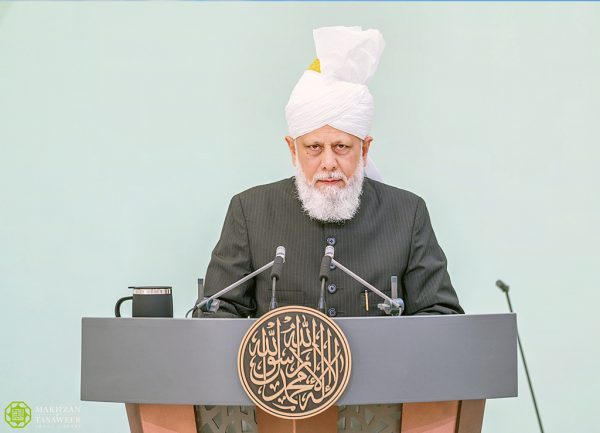Summary prepared by The Review of Religions
After reciting Tashahhhud, Ta‘awwuz and Surah al-Fatihah, His Holiness, Hazrat Mirza Masroor Ahmad (aba) said that he would continue mentioning details regarding the Expedition of Tabuk.

His Holiness (aba) said that on this occasion, the hypocrites attempted to cause harm to the Holy Prophet (sa). There was a joint effort brewing between the Jews, Christians and hypocrites to try and kill the Holy Prophet (sa). Yet, every time it seemed that the Muslims’ defeat was certain, God miraculously helped the Muslims and the Holy Prophet (sa), granting decisive victory. This was no different in the case of the Expedition of Tabuk; from the journeys going to and returning from Tabuk which were enough to completely baffle the hypocrites, to the fleeing of the army commissioned by the Roman Emperor, or the fact that they did not even come face to face with the Muslims for battle out of fear, and the tribes at the borders of Arabia coming to the Holy Prophet (sa) seeking peace treaties were all examples of the plots of ploys of the hypocrites being foiled and the God rendering miraculous help to the Muslims.
A Final Attempt of the Hypocrites to Harm the Muslims
His Holiness (aba) said that as the Muslims were beginning their return journey to Madinah, the hypocrites made one last attempt to render the Muslims and the Holy Prophet (sa) unsuccessful. They did this by making an attempt on the life of the Holy Prophet (sa). The prominent leaders of the hypocrites had accompanied the Muslim army and were spreading false propaganda throughout. It only made sense that their plot during the return journey was premeditated. As the Muslim army made its way back to Madinah, there came a point in the journey when a valley split into two paths: one was a vast plain, while the other was a narrow path, a shortcut. The Muslims planned to take this shortcut; however, the hypocrites thought that since it was a narrow path and there was an elevated portion of that path passing through the mountains, there would be a large concentration of Muslims in a small area all at once. They thought to take advantage during the night, and plotted to gather around the Holy Prophet (sa), startle his camel, cut its reins, and cause it to fall from an elevated part of the narrow path, making it seem as though it were an accident.
His Holiness (aba) said that God informed the Holy Prophet (sa) of this sinister plot. As a result, the Holy Prophet (sa) announced that aside from himself and three companions who would take the shortcut path, the remaining army would take the vast path. This would seem to bring an end to the plot hatched by the hypocrites. However, they persisted and decided that 12-15 of them would cover their faces, approach the Holy Prophet (sa), and startle his camel. And that’s exactly what they attempted to do. They approached the camel and tried to startle it; upon this, the Holy Prophet (sa) instructed one of the accompanying companions to pursue these people and cause them to retreat. When the Holy Prophet (sa) asked whether they had recognised them, the companions said that their faces were covered; however, they recognised their riding animals. The Holy Prophet (sa) told his companions what their plot had been. When the companions asked whether he would punish those people, the Holy Prophet (sa) said that he would not, for he did not want the people of Arabia to say that he killed his own people. Then, the Holy Prophet (sa) received a revelation, upon which he called one of the companions close and said that he would tell him something which he should keep secret. The Holy Prophet (sa) proceeded to tell him the names of each one of the hypocrites who had attempted to attack him. The Holy Prophet (sa) said that he had been instructed not to lead the funeral prayers of any of them as they were hypocrites.
Treatment of the Holy Prophet (sa) to the Hypocrites
His Holiness (aba) said that the companion to whom the Holy Prophet (sa) told this was Hazrat Hudhaifah (ra), and upon the instruction of the Holy Prophet (sa), he kept these names secret. During the time of the caliphate of Hazrat Umar (ra), whenever someone passed away and he had doubts about them being from among the hypocrites, especially those who had tried attacking the Holy Prophet (sa), he would ask Hazrat Hudhaifah (ra) to accompany him for their funeral. If Hazrat Hudhaifah (ra) refused to accompany him, he would know that they were one of the people whom the Holy Prophet (sa) had told Hazrat Hudhaifah (ra) about, and thus he too would not go for their funeral prayer.
His Holiness (aba) said that the next morning, Hazrat Usaid (ra), the chieftain of the Aus, met with the Holy Prophet (sa), and the Holy Prophet (sa) informed him about the events of the previous night and the attempt on his life. Upon this, Hazrat Usaid (ra) requested that the Holy Prophet (sa) give the order for those people to be brought to justice. However, the Holy Prophet (sa) replied that he did not wish for people to say that, once his battles with the disbelievers ended, he began going after his own people. Hazrat Usaid (ra) responded, saying, ‘How could those who had attacked him be considered his own people?’ The Holy Prophet (sa) asked, ‘Do they not profess the Islamic creed?’ Hazrat Usaid (ra) said that even though they did, it was only superficial. The Holy Prophet (sa) said that, be that as it may, they still professed the Islamic creed, and on this account alone, he would not give the order for them to be given capital punishment.
His Holiness (aba) said that the so-called clerics of today who give orders for those who profess the Islamic creed to be killed should bear this instruction of the Holy Prophet (sa) in mind.
The Hypocrites Turn to Rome for Help & the Demolition of Masjid al-Dirar
His Holiness (aba) said that, having seen their own plots foiled and realising that the surrounding tribes had also entered into treaties with the Holy Prophet (sa), including the Jewish tribes, the hypocrites thought it time to seek help from outside Arabia, particularly from the Roman Emperor. They also sought to set up a sort of headquarters in Madinah where they could hold meetings and plan against the Muslims. They would also store weaponry here; however, it should be such that it remains out of sight from the Muslims. The hypocrites had joined forces with Banu Amir, who suggested that this headquarters be established in Quba.
His Holiness (aba) said that according to narrations, when the Holy Prophet (sa) returned to Madinah, Abu Amir met the Holy Prophet (sa) and asked him about Islam. The Holy Prophet (sa) told him and invited him to Islam. However, Abu Amir refused and instead mocked the Holy Prophet (sa). He mockingly said that whoever between the two was false, God should have them expelled from the land and killed. The Holy Prophet (sa) said that certainly this should be the case. However, as Muslim numbers continued to increase, Abu Amir grew increasingly frustrated. He had joined forces with the hypocrites and had a mosque built in Quba to serve as their headquarters, known as Masjid al-Dirar. Here, like-minded people would gather, and Abu Amir would incite them to oppose the Holy Prophet (sa). His ultimate goal was to drive the Muslims out of Madinah.
His Holiness (aba) said that Abu Amir went and met with the Roman Emperor Heraclius and incited him further against the Muslims, and said that there was nothing to fear. Heraclius said that he would help them. Abu Amir conveyed this news to the hypocrites who built their mosque in Quba. However, ultimately, Abu Amir was unable to see his purpose through, as he was still in Syria when he died alone; in other words, his words to the Holy Prophet (sa) proved true, except they proved true in his own case.
His Holiness (aba) said that these were events that took place prior to the Holy Prophet (sa) setting out for Tabuk. The hypocrites had approached the Holy Prophet (sa), asking him to pray at their mosque, lying and saying that they had constructed it for good purposes. The Holy Prophet (sa) said that perhaps he would pray at the mosque upon returning from his journey. When the Holy Prophet (sa) returned from Tabuk, the following Qur’anic verse was revealed with regard to the mosque:
‘And among the hypocrites are those who have built a mosque in order to injure Islam and help disbelief and cause a division among the believers, and prepare an ambush for him who warred against Allah and His Messenger before this. And they will surely swear: “We meant nothing but good,” but Allah bears witness that they are certainly liars.’ (The Holy Qur’an, 9:107)
His Holiness (aba) said that upon receiving this revelation, the Holy Prophet (sa) instructed certain companions to go to Quba and destroy this ‘mosque’. When fire was set to the mosque, those who attended it scattered and fled. At every instance, the Holy Prophet (sa) forgave the grievances committed by the hypocrites, and always overlooked their excesses. It was only when they posed a threat to the state that the Holy Prophet (sa) took action, and that too was only against the headquarters where they gathered.
Expression of Love Upon the Holy Prophet’s (sa) Arrival in Madinah
His Holiness (aba) said that when the Holy Prophet (sa) was returning to Madinah, he expressed his love for Madinah and its inhabitants. As he approached Madinah, the Holy Prophet (sa) expressed that he loved every part of Madinah. According to one narration, the Holy Prophet (sa) said that he wished to go back to Madinah swiftly, and whoever wished to return swiftly should join him. The Holy Prophet (sa) also said that there was prosperity in all the homes of the Ansar.
His Holiness (aba) said that there were two groups of people who stayed back from the Battle of Tabuk: a group of hypocrites regarding whom God expressed His displeasure, and the other was a group of those who were sincere in faith and wished to partake in the battle, but were either so poor that despite their efforts they could not join the army, or they could not participate on account of some illness or ailment, and God accepted their excuse. When the Holy Prophet (sa) returned to Madinah, the Holy Prophet (sa) said that there were some in Madinah who were in fact with the Muslim army throughout their journey in spirit, referring to those who had remained behind due to a valid reason. The Holy Prophet (sa) said that the prayers that they had made while in their homes were more effective than the wielding of weapons, and so they too were part of the blessings of this journey.
His Holiness (aba) said that when the Holy Prophet (sa) returned to Madinah, he was greeted by men, women and children who gathered in Thaniyah al-Wada and sang couplets welcoming the Holy Prophet (sa) home.
His Holiness (aba) said that he would continue mentioning aspects from the life of the Holy Prophet (sa) in the future.




Add Comment